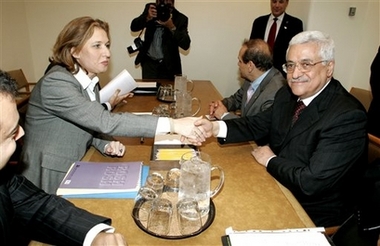JERUSALEM - Israel wants to reopen a serious dialogue with Palestinian
President Mahmoud Abbas and work with him to establish a Palestinian state,
Israeli Foreign Minister Tzipi Livni said Tuesday.
Livni spoke after meeting Monday with Abbas in New York, in the first working
session between high-ranking Israeli and Palestinian officials in four months.
Their talks coincided with Abbas' efforts to persuade the Palestinians' Hamas
rulers to moderate their anti-Israel policies and join with his Fatah party in a
coalition government.
|

Tzipi Livni, left, Foreign Minister of Israel
meets with Palestinian President Mahmoud Abbas, also known as Abu Mazen,
at U.N. Headquarters in New York Monday, Sept. 18, 2006.
[AP]
|
"I don't see this as one meeting and each side checks off a box and goes
home," Livni told Israel's Army Radio about her talks with Abbas on the
sidelines of the U.N. General Assembly. "The idea is to establish a permanent
channel of dialogue."
"We have a goal ... of achieving a two-state solution," she said.
Israel's dialogue with the Palestinians has been largely frozen since Hamas,
which is sworn to Israel's destruction, won Palestinian parliamentary elections
in January. But Israel considers Abbas — a moderate elected separately in 2005 —
an acceptable negotiating conduit.
"It was a very, very positive meeting with Mrs. Livni. We talked (about)
everything," Abbas said after the talks at the United Nations.
Abbas and Livni discussed reopening the dialogue between Israeli and
Palestinian officials, including a meeting between Abbas and Israeli Prime
Minister Ehud Olmert, as soon as possible, Palestinian negotiator Saeb Erekat
said.
Abbas agreed to an unconditional meeting with Olmert that would be part of a
series of meetings between Palestinian and Israeli officials, he said.
The two leaders were about to hold their first working meeting in June when
Hamas-affiliated militants captured an Israeli soldier, derailing all efforts at
talks.
Abbas promised Livni to "exert maximum effort" to secure the soldier's
release, Erekat said.
Livni said she told Abbas that Israel stood firm by its refusal to deal with
Hamas until it renounces violence, recognizes signed peace agreements and
recognizes Israel. Hamas has resisted these demands, though, and that could
compromise the establishment of a coalition government and dash Abbas' hopes of
restoring hundreds of millions of dollars in international funding cut off after
Hamas took power.
Yielding to growing domestic pressure, Hamas agreed last week to form a
coalition with Fatah in the hopes of lifting the economic boycott, which has
made it impossible for the government to pay employees who provide for one-third
of all Palestinians. But the U.S. and EU want clearer statements on the new
government's commitment to peace efforts.
Although Israel has postponed its plan to withdraw from large areas of the
West Bank, the government is interested in advancing in the U.S.-backed "road
map" peace plan that outlines the formation of a Palestinian state, Livni said.
"The road map is still on the table," she said.
| 1 | 2 |  |